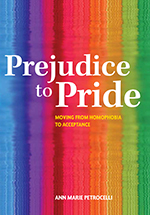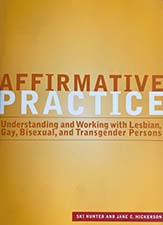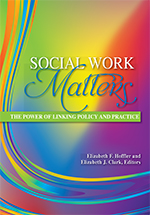Prejudice to Pride: Moving from Homophobia to Acceptance describes a journey, moving from ignorance and falsehoods about gay men and lesbians toward understanding and acceptance of the gay community. The book contains the knowledge and experiences of lesbian and gay people meant to educate people about who gay people are, in the hope that people will understand and support the gay community.
The book is divided into five sections and 16 chapters covering a range of issues, including: Heterosexist parents’ influence on their gay children’s lives; how gay people remain closeted or come out; coming out; the role of organized religious leaders in preventing equality for gay men and lesbians; the past labeling of homosexuality as a mental disorder and its effect on gay people’s mental health; damage caused by homophobia; and attitudes and beliefs and gay advocacy and equality.
Using the sociological framework of moral panic—periods of exaggerated public fear triggered by high-profile incidents linked to feared social groups—Michael H. Eversman illuminates historic and contemporary moral panic episodes to show how political discourse and stereotyping lead to policymaking and enforcement that maintain social inequalities. Those most affected by these harsh and reactionary policies tend to be vulnerable populations known as “folk devils”—young people, public assistance recipients, immigrants, LGBTQ individuals, those with mental illness, and illicit drug users—groups that have long served as feared targets of moral condemnation.
Today, social work and human services professionals must be prepared to deliver knowledgeable and unbiased services to lesbian, gay, bisexual, and transgender persons. For the first time, an unprecedented new resource sheds light on effective practice with LGBT populations. Presented in a thorough and sensitive style, Affirmative Practice delivers an extraordinary study of the history, knowledge, theory, and techniques that provide a framework for affirmative and nonjudgmental practice.
Affirmative Practice chronicles the history of LGBT communities and provides an intimate understanding of the LGBT lifestyle from individual, family, and community perspectives. Drawing from extensive research and using clear, crisp writing, the authors examine the cultural, social, political, and legal issues within each community and address special groups along racial, ethnic, and age criteria.
Social justice is the fuel that drives social workers and what sets social work apart from other professions. Social workers form the front line of defense for their clients and make up the threads of society’s social safety net. The strength of that net, however, depends not just on the strengths of social workers, but also on the social policies that undergird their practice, defining the horizons of possibility – for themselves and their clients – in specific situations.
In Social Work Matters: The Power of Linking Policy and Practice, Elizabeth F. Hoffler and Elizabeth J. Clark bring home the truth embodied in that title for practitioners and researchers in a comprehensive range of settings. At heart, the book argues that social work matters because the profession is absolutely necessary to the healthy functioning of society.
_______________________________________________
For more information about all NASW Press titles, including books, eBooks, reference works, journals, brochures, and standards, visit the NASW Press website. If you have questions, please send an email to NASWPress@BrightKey.net or call 1-800-227-3590.








